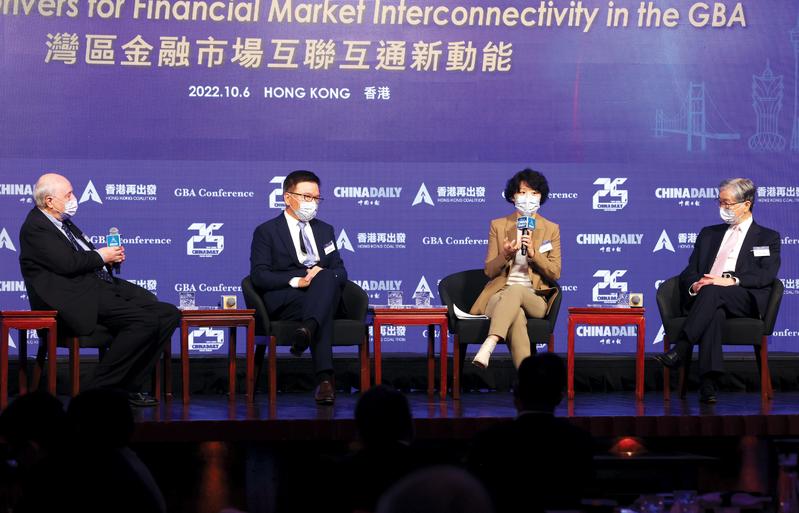 Thoughtful conversation between (from left) the panel chair Anthony Neoh, chair of the Asian Academy of International Law; KC Chan, chairman of WeLab Bank; Cui Li, chief economist, managing director and head of macro research of China Construction Bank International; and Carson Wen, chairman of BOA International Financial Group during the panel discussion styled “New Growth Drivers for Financial Market Interconnectivity in the GBA”. Xiao Geng, director of the Institute of Policy and Practice, Shenzhen Institute of Finance, joins the session online. (ANDY CHONG / CHINA DAILY)
Thoughtful conversation between (from left) the panel chair Anthony Neoh, chair of the Asian Academy of International Law; KC Chan, chairman of WeLab Bank; Cui Li, chief economist, managing director and head of macro research of China Construction Bank International; and Carson Wen, chairman of BOA International Financial Group during the panel discussion styled “New Growth Drivers for Financial Market Interconnectivity in the GBA”. Xiao Geng, director of the Institute of Policy and Practice, Shenzhen Institute of Finance, joins the session online. (ANDY CHONG / CHINA DAILY)
With the implementation of the national strategy for the Guangdong-Hong Kong-Macao Greater Bay Area, the 11-city cluster should leverage its unique advantages to embrace closer economic and financial interconnectivity, which is crucial to powering future growth.
Experts and business leaders made the remarks on Thursday at a panel discussion at the Greater Bay Area Conference 2022 and the 25th Anniversary Ceremony of China Daily Hong Kong Edition.
Anthony Neoh, chair of the Asian Academy of International Law, said in his keynote address that the Greater Bay Area boasts various growth drivers, such as an expanding population and a leading financial ecosystem.
“If you look at the GBA itself, it consists of 70 million people at the moment, and in the next 15 years, it will grow to 100 million people,” said Neoh. “That kind of energy produced by people would be very, very important, and it promises a great deal of future.”
The area also has two of the largest stock markets in the world by liquidity, namely those of Hong Kong and Shenzhen, Neoh said, adding that the GBA is “a world of contrasts”, where three systems and three currencies exist — in the Hong Kong SAR, Macao SAR and Guangdong province.
 Participants have a good time engaging in dialogue and reading China Daily Hong Kong during the conference. (EDMOND TANG / CHINA DAILY)
Participants have a good time engaging in dialogue and reading China Daily Hong Kong during the conference. (EDMOND TANG / CHINA DAILY)
The regional economy is so important and strong that Hong Kong cannot be alone, said KC Chan, chairman of WeLab Bank. Together with other parts of the GBA, Hong Kong should tap into the Association of Southeast Asian Nations’ growing digital economy, propelled by their “attractive” demographic and technological base, he said.
“Hong Kong must be a connector and facilitator, not just a marketplace to serve a local customer base,” Chan said.
He believes the city does need to do more in terms of developing the financial markets and technology sector, including bringing in talent and attracting companies.
On the same panel, Cui Li, chief economist, managing director and head of macro research of China Construction Bank International, said the GBA can “play a big role” in terms of international risk sharing.
Citing the first insurance securities which were issued in Hong Kong last year for international investors, she said such a kind of risk-sharing platform in the region will be an important and promising area to work on.
 Participants have a good time engaging in dialogue and reading China Daily Hong Kong during the conference. (EDMOND TANG / CHINA DAILY)
Participants have a good time engaging in dialogue and reading China Daily Hong Kong during the conference. (EDMOND TANG / CHINA DAILY)
Carson Wen, chairman of BOA International Financial Group, suggested the central government consider moving the border for Hong Kong’s quarantine system to the GBA, so that people in the region could enjoy easy movement.
“Unless people can move around easily, there is no way for Hong Kong and the Greater Bay Area to work closely together,” Wen said.
Xiao Geng, director of the Institute of Policy and Practice, Shenzhen Institute of Finance, noted that the development of the GBA presents a challenge which must be addressed: that of integrating Hong Kong’s offshore market and the Chinese mainland’s onshore market without changing the fundamental nature of the “one country, two systems” principle.
One way to tackle this challenge, according to Xiao, would be to establish a “special economic zone” between Hong Kong and mainland cities in the GBA, where offshore companies can be regulated by Hong Kong, but have an operating center in places like Qianhai or Nansha.
“Basically, we could maintain ‘one country, two systems’, and maintain the onshore-offshore difference. But at the corporate level, we could have some exceptions to allow those leading corporations to achieve much much better internal allocation and also a free cross-border movement of their people, their money and their information,” said Xiao. “That is really a win-win solution.”
Contact the writer at suzihan@chinadailyhk.com


